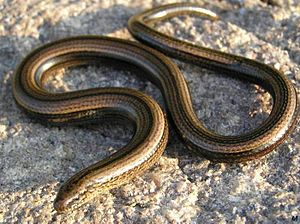Legless lizard facts for kids
Legless lizards are amazing reptiles that look a lot like snakes, but they are actually lizards! Over a long time, many different types of lizards have lost their legs, or their legs have become so small they don't use them to move around. This has happened in many different lizard families all over the world.

Contents
What Makes a Legless Lizard Different from a Snake?
It can be tricky to tell a legless lizard from a snake. But there are some key differences to look for:
- Eyelids: Most legless lizards have eyelids, just like you do. Snakes do not have eyelids; their eyes are covered by a clear scale.
- Ear Openings: Many legless lizards have small ear openings on the sides of their heads. Snakes do not have external ear openings.
- Belly Scales: Snakes usually have wide scales across their bellies that help them grip the ground and move. Many legless lizards have smaller, more uniform scales all over their bodies.
- Tongue: Some legless lizards have a notched tongue, but it's not as deeply forked as a snake's tongue.
- Tail Length: Legless lizards often have very long tails and shorter bodies. Snakes, on the other hand, have long bodies and much shorter tails.
Families of Legless Lizards
Many different lizard families have developed legless bodies. It's like different groups of lizards all found their own way to live without legs! Here are some examples:
Anguidae
This family includes about 102 species, and 17 of them are legless. You might know some of these as glass lizards or slow-worms. They live in places like Eurasia and North America.
Cordylidae
This family lives in Africa and has 66 species. One special group, called Chamaesaura, has five species where their back legs are super tiny. They are just small bumps covered in scales!
Pygopodidae
All 44 species in this family are legless. They are often called flap-footed lizards or scaly-foot lizards. This is because even though they don't have front legs, their back legs are tiny flaps without toes. Most of these lizards live in Australia. Two species of Lialis also live in New Guinea. Pygopodids are actually related to geckos!
Dibamidae
All 23 species in this family are legless. They are mostly blind and spend their lives burrowing underground. You can find them in Mexico and Southeast Asia.
Anniellidae
This family has only one group, Anniella, which includes six species of legless lizards. They live in central and southern California, USA, and Baja California, Mexico.
Gymnophthalmidae
This is a large family from Central and South America. Many species in this group have very small limbs. The 23 species in the Bachia group are very good at escaping. They move by making quick "figure-8" flicks with their bodies and tails!
Scincidae
These are commonly known as skinks, and it's the largest lizard family with over 1500 species! Many skinks are legless or have very tiny legs. You can find these legless skinks in Africa, Australia, southern Europe, and North Africa.
Amphisbaenia
This group includes over 180 species, and most of them are legless. They are often called "worm lizards" because of their unique, ringed bodies.
 | Emma Amos |
 | Edward Mitchell Bannister |
 | Larry D. Alexander |
 | Ernie Barnes |

